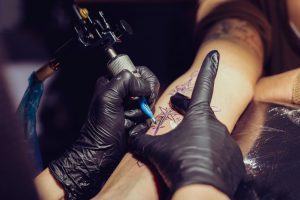AKAP Accreditation Organization

$250.00


A tattoo artist (also tattooer or tattooist) is an individual who applies permanent decorative tattoos, often in an established business called a “tattoo shop”, “tattoo studio” or “tattoo parlour”. Tattoo artists usually learn their craft via an apprenticeship under a trained and experienced mentor.
Tattoo artists can create original tattoo designs for their customers, or they may use flash (pre-drawn, stock images) or variations of known designs.
A tattoo artist traditionally earns the title by completing an apprenticeship under strict guidelines from an experienced senior tattoo artist. A tattoo apprenticeship can last as long as five years.
The apprentice will be trained in sanitation and proper safety techniques, typically during the first six months to a year of the apprenticeship. During this time, the apprentice is not allowed to tattoo, but will be expected to maintain the cleanliness of the studio and learn by observation.
The cost of apprenticing can range from free labor around the shop to tens of thousands of dollars. Apprentices are generally expected to be excellent at drawing, with an ability to excel at customizing design ideas and genres, as well as various other styles of art in general.
Some of the tools of the trade have greatly evolved while some have stayed the same, such as the tattoo machine. The traditional machine has not changed from its original design and/or concept. With the rise of new machine designs, however, both air- and electric-powered tools such as the rotary and pneumatic tattoo machine have made their way into the industry.
A practitioner may also use many different needle sets, such as round liner needles, round shader needles, flat shaders, and magnum (mag) needles.
The amount of needles attached to the needle bar change, as well. For instance, magnum needle groups range from 5 to 55 needles on one bar. A practitioner must have the basic tools to provide a tattoo.
All other items at the artist’s disposal are as different as each tattoo. Basic tools include the tattoo machine, power supply, clip cord, foot pedal, grip, tips, grip stem, needles, and tattoo ink.
In some countries equipment must only be sold to registered studios who are provided a certificate by their local environmental health department.
We evaluate and assess Tattoo artist certificate in our organization.
You can be accredited and get personal skill certificate by AKAP Accreditation Organization.
Benefits of Tattoo artist certificate:
Join to AKAP community for get your Tattoo artist certificate.